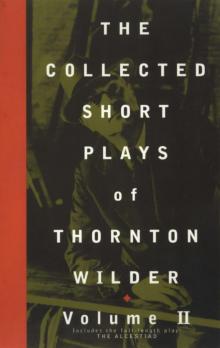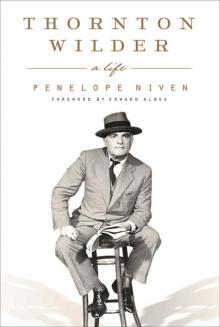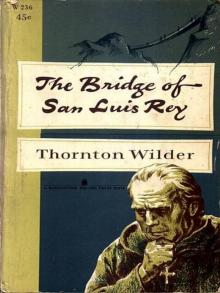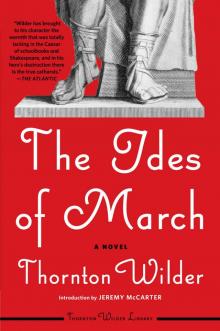- Home
- Thornton Wilder
Theophilus North Page 8
Theophilus North Read online
Page 8
“Well, Chief, I think that there was no murder, and not even mayhem; there was just brutishness and somehow it got mixed up in the popular imagination with spooks.”
“And now there’s nothing we can do about it. Remember, it never reached the police desk. The ravings of a man in delirium tremens are not a deposition. Owens shipped out of town and has not been heard from since. I’m glad to have met you, Mr. North.”
I had got what I wanted. We parted with my usual dishonest assurances that I would share with him any further information that came to light. As far as I was concerned that problem was solved, but my imagination had been occupied for some time with a far more difficult problem: What way could be found to dispel the “malediction” that rested on the Wyckoff House? Explanations and appeals to reason have no power to efface deeply ingrained and even cherished dreads.
I had glimpsed an idea.
One afternoon when I had presented myself at the door for the accustomed reading, I found a barouche, a coachman, and a pair of what used to be called “spanking” horses waiting in the driveway. Miss Wyckoff met me in the hall, dressed to go out. She begged my pardon, saying that she had been called to visit an invalid friend; she would be back within half an hour. Her maid was standing beside her.
“Miss Wyckoff, may I have permission to visit the rooms on the first floor? I greatly admire what I have seen of the house and would like to see some of the other rooms.”
“Oh, yes, indeed, Mr. North. Make yourself completely at home. Mrs. Delafield will be glad to answer any questions, I’m sure.”
It was a beautiful spring afternoon. All the doors were open. I viewed the great hall from all sides; I saw the dining room and the library for the first time. Everywhere I was arrested by some felicity of detail, but above all I was held by the harmony of the entire structure. “This is Palladio,” I thought. “He himself was the heir of great masters and this is one of his descendants, just as Versailles is; but this is nearer the Italian source.” When I was returning through the great hall to my work table Mrs. Delafield said, “Years ago before the master started going on expeditions, they used to give musical parties here. Have you heard of Padderooski, Mr. North? . . . He played here, and Ole Bull, the Norwegian violinist. And Madame Nellie Melba—have you heard of her? Very fine, she was. Those were lovely days. Just think of it now! It’s a shame, isn’t it?”
“You haven’t seen or heard anything that made you uncomfortable, have you, Mrs. Delafield?”
“Oh, no, sir—not a thing!”
“Would you be willing to spend the night here?”
“Well, sir, I’d rather not. I know that maybe it’s all foolishness, but we’re not always in control of our feelings, if you know what I mean.”
“What do people think took place here?”
“I don’t like to talk about it or think about it, sir. Some people say one thing and some people say another. I think it’s best to leave things as they are.”
The readings continued. Miss Wyckoff seemed relieved that no intimation of a sinister nature came to our attention. We read on for the pleasure of reading, for the Wyckoffs were admirable letter writers. But all the time the idea of what was possible was growing in my head.
I have told of the various aspirations that had successively absorbed me when I was a very young man. A journalist’s life was not among them. My father was a newspaper editor both before and after he was sent on consular missions to China. He brought a dedication to it that I was never able to share. To me it smacked too much of the manipulation of public opinion, however sincerely prompted. The idea that was developing in my head for the rehabilitation of Wyckoff House involved precisely that, but I didn’t know how to go about it.
Chance opened the way to me.
The account of my relation to Wyckoff House falls into two parts. The second part led me into the Eighth City—that of camp-followers and parasites to whom I had so close an affinity. It led me to Flora Deland.
By the fifth week in Newport my schedule had begun to be exacting. The professional coach returned to the Casino and I was relieved of the second hour of instructing children, but all day I was busy with French or Latin or arithmetic in one house or another. I searched for somewhere to have lunch in as quiet a place as the town afforded. I found the Misses Laughlins’ Scottish Tea Room—where Diana Bell and Hilary Jones had done their courting—in the heart of the Ninth City. It was frequented by girls from offices, some schoolteachers of both sexes, some housewives “downtown shopping”—a subdued company. The food was simple, well-cooked, and cheap. I had noticed a strange apparition there and hoped to see it again—a tall woman sitting alone, dressed in what I took to be the height of fashion. One day she reappeared. She wore a hat resembling a nest on which an exotic bird was resting, and an elaborate dress of what I think used to be called “changeable satin,” blues and greens of a peacock’s feathers intermingling. Before eating it was necessary that she remove her gloves and raise her veil with gestures of apparently uncalculated grace. Zounds! What was this? As before, when she entered or rose to take her departure the room was filled with the rustle of a hundred petticoats. Not only what was she, but why should she visit our humble board?
Her face was not strictly beautiful. Norms of feminine beauty change from century to century and sometimes oftener. Her face was long, thin, pale, and bony. You will later hear Henry Simmons describe it as “horsy.” It can be seen in Flemish and French paintings of the fifteenth and sixteenth centuries. The kindest thing that could be said of it in 1926 was that it was “aristocratic,” a designation more apologetic than kind. What was sensational about her was what we lustful soldiers at Fort Adams used to call her “build,” her “altogether,” her “figger.”
You can imagine my surprise when on leaving she approached me with extended hand and said: “You are Mr. North, I believe. I’ve long wanted to introduce myself. I am Mrs. Edward Darley.—Might I sit down for a moment?”
She took her time, seating herself, her eyes resting on mine in happy recognition of something. I remembered hearing that the first thing a young actress is taught in dramatic school is to sit down without lowering her eyes.
“Perhaps you might know me better under my nom de plume. I am Flora Deland.”
I had lived a sheltered academic life. I was one of the meager thirty million Americans who had never heard of Flora Deland. Most of the others in this thirty million had never been taught to read anything. I made appreciative noises, however.
“Are you enjoying life in Newport, Mr. North?”
“Yes—very much indeed.”
“You certainly do get about! You are everywhere—reading aloud to Dr. Bosworth all those fascinating things about Bishop Berkeley; and reading the Fables of La Fontaine with the Skeel gairl. What a learned man you must be at your age! And so very clever, too—I mean resourceful. The way you managed the foolish elopement of Diana Bell—think of that! Diana is a sort of cousin of mine through the Haverlys. Such a headstrong gairl. It must have been perfectly marvelous the way you persuaded her not to make a fool of herself. Do tell me how you did it.”
Now I have never been a handsome man. All I’ve got is what was bequeathed to me by my ancestors, together with that Scottish jaw and those Wisconsin teeth. Elegant women have never crossed a room to strike up an acquaintance with me. I wondered what was behind these amiabilities—then, suddenly, it struck me: Flora Deland was a smearer, a newspaper chatterbox. With her I was in the Eighth City—the parasitic camp-followers.
I said, “Mrs. Darley—how do you like to be called, ma’am?”
“Oh, call me Miss Deland,” adding lightly, “You may call me Flora—I’m a working woman.”
“Flora, I have not a word to say about Miss Bell. I have given my promise.”
“Oh, Mr. North, I didn’t mean for publication! I’m simply interested in cleverness and resourcefulness. I like people who use their wits. I’m a frustrated novelist, I suppose. Do let’s say t
hat we’re friends. May we?” I nodded. “I lead a whole other life that has nothing to do with the newspapers. I have a cottage at Narragansett Pier where I love to entertain at the weekend. I have a guest cottage and can put you up. We all need a change from time to time, don’t we?” She rose and again extended her hand. “Can I call you up at the Y.M.C.A.?”
“Yes . . . yes.”
“And what may I call you—Theophilus?”
“Teddie. I prefer being called Teddie.”
“You must tell me about Dr. Bosworth and Bishop Berkeley, Teddie. What a household that is at the ‘Nine Gables’! Goodbye again, Teddie, and do accept an invitation to come to my dear little ‘Sandpiper’ for swimming and tennis and cards.”
A working girl with a hundred and twenty million readers and a figure like Nita Naldi’s and a speaking voice of smoked velvet like Ethel Barrymore’s. . . . Oh, my Journal!
This was not a matter to submit to Mrs. Cranston. This was for a man among men. “Henry,” I said, as we were chalking our cues at Herman’s, “who are some of the smearers that hang around town?”
“Funny, you asked me that,” he said and went on with the game. When we’d finished the set he beckoned me to the remotest table and ordered our usual.
“Funny, you asked me that. I saw Flora Deland on the street yesterday.”
“Who’s she?”
In all barbershops and billiard parlors there are tables and shelves bearing old and new reading matter for the customers to glance at while waiting to be called. Henry went to a pile and unerringly pulled out the Sunday supplement of a Boston paper. He opened it and spread it wide before me: “NEW YORK JUDGE BLAMES MOTHERS FOR INCREASING DIVORCE RATE AMONG THE FOUR HUNDRED, By our special correspondent Flora Deland.”
I read it. Terrible situation. No names mentioned; certain hints that would be clearer to more experienced readers than myself.
“Cowboy,” he continued (Henry presumed that Wisconsin was in the center of the Wild West), “Flora Deland comes from the oldest and most respected families of New York and Newport. None of that railroad and mining stuff—the real Old Guard. Related to everybody. Very high-spirited—‘fast,’ like they say. Made a few mistakes. It’s all right to break up a family or two, but don’t break up a family where the money’s broken up, too. She ran out of her allowance of pardonable mistakes. Got a man disinherited. Flora’s relations wouldn’t see her. Are you following me, old cully? What’s the poor girl to do? Can’t even borrow money from Aunt Henrietta. She’d ’ad it. So she takes to pen and paper; becomes a smearer—real stuff from the inside. Like . . . like . . . many wives overspend their allowance; don’t dare tell their husbands; where do you pawn your diamond tiara? In Wisconsin they eat it up. Now the stuff she writes under the name of Deland is fairly under control; but we know that she writes under other names too. She’s got a feature called ‘What Suzanne Whispered to Me,’ signed ‘Belinda.’ Makes your eyes pop. Must make a lot of money, one way or another. Goes on lecture tours, too; ‘A Newport Girlhood.’ Funny stories about how we’re all monkeys here.”
“Does she spend the whole summer in Newport, Henry?”
“Where’d she go? The La Forge Cottages wouldn’t consider it. The Muenchinger-King makes it a rule—or says it’s a rule—that no guest can stay over three nights. She has a place at Narragansett Pier. The Pier is livelier than Newport—better beaches, younger set, better hideaways, clubs where you can play—all that.”
“Where does she get her information from?”
“Nobody knows. Probably has plants—nurses in hospitals, for example. Patients will talk. Lots of talk goes on in beauty parlors. Servants, almost never.”
“Is she beautiful, Henry?”
“Beautiful? Beautiful! She’s got a face like a horse.”
My invitation to visit “The Sandpiper” came through. Saturday for dinner until Monday morning: “I have plenty of swimsuits for you here. You’d only need one in the day. We often go in au naturel at midnight to cool off.” To freeze, I suppose; the New England waters are not even tolerable until August.
I was going on the trip to enlist Flora Deland in my PLAN relative to the Wyckoff House; Flora Deland had invited me because she wished to obtain some information from me. I foresaw some form of negotiation. I had a service to ask of her. I did not take seriously the possibility that there might be a little romancing involved; I had never been in that kind of business with a woman almost fifteen years older than myself, but as the old hymn says: “Where duty call or danger, Be never lacking there.”
It was on my mind that I wished to get off the island with my bicycle without being observed by the police and others. Luck came to my aid. As I waited at the first of the two ferry slips (in those days it required two ferry rides to get to Narragansett, as the reader may recall) I heard my name called from a standing car.
“Herr North!”
“Herr Baron!”
“Can I carry you anywhere? I’m going to Narragansett Pier.”
“So am I. Have you room for my bicycle, too?”
“Naturally.”
This was the Baron Egon Bodo von Stams whom I had met many times at the Casino and who used to enjoy conversations in my enthusiastic hit-and-miss German. He was known as “Bodo” to everyone except Bill Wentworth and myself. He was an attaché at the Austrian Embassy in Washington on early leave for his second summer at Newport; a house-guest of the Venables at “Surf Point,” even in the absence of the owners. He was the most likable fellow in the world. Two years older than I, endowed with a forthrightness and candor that approached naïveté. I climbed in and we shook hands.
He said, “I’ve been invited for the weekend by Miss Flora Deland—do you know her?”
“I’ve been invited there too.”
“That’s fine! I didn’t know who I’d meet there.”
We talked of this and that. On the second ferry boat, I asked: “Where did you meet Miss Deland, Herr Baron?”
He laughed. “Well, she came up to me and introduced herself at that bazaar for crippled children at the church on Spring Street.”
I held my tongue for half an hour. When we approached the driveway of our hostess’s cottage I said, “Herr Baron, stop the car a moment. I want to be sure that you understand where you’re going.”
He stopped the car and looked at me questioningly.
“You are a diplomat and a diplomat should always know exactly what is going on around him. What do you know about Miss Deland and what she’s interested in?”
“Why, nothing much, old man” (Bodo had been to Eton), “but that she’s a cousin of the Venables and she’s a writer, too—novels and things like that.”
I paused, then said, “The Venables haven’t asked her to their house for at least fifteen years. They might be deeply offended if they knew you had visited hers. She was born into their class and circle; but she lost it. Do not ask me how; I don’t know. She earns her living by writing thousands of words every week about what is called ‘society.’ Have you such journalists in Vienna?”
“Oh, in politics we have! They are very rude.”
“Well, Miss Deland is very rude about the private lives of men and women.”
“Will she write rude things about me?”
“I think not, but she will say that you were a guest in her home and that will give an air of authenticity to stories she tells about other people—the Venables, for instance.”
“But that is terrible! . . . Thank you, thank you for telling me. I think I should drop you at her house and go back to Newport and telephone her that I have the influenza.”
“Herr Baron, I think that would be wise. You represent your country.”
He turned about in his seat and said to me directly: “Then why do you come to her house? If what she does is as bad as that, why do you come here?”
“Oh, Herr Baron—”
“Don’t call me Herr Baron! Call me Bodo. If you are kind enough to open my eyes to this mistake, yo
u can be kind enough to call me Bodo.”
“Thank you. I shall call you Bodo only in this car. I am an employee at the Casino. I am a schoolmaster on a bicycle who gets paid by the hour.”
“But we are in America, Theophilus. (What a beautiful name that is!) Here everybody calls everybody else by their given names after five minutes.”
“No, we are not in America. We are in a little extraterritorial province that is more class-conscious than Versailles.”
He laughed, then again solemnly asked, “Why are you here?”
“Well, I’ll tell you another time.” I pointed to the house before us. “This is a part of Newport’s demimonde. Miss Deland is what you would call a déclassée. She has been ostracized, but during the summer all she thinks about is Newport—her Paradise Lost. I do not know what other guests will be at her house tonight, but the outcasts huddle together, just as you toffs do.”
“I’m coming with you. I don’t care what she writes about me.” He started the engine, but I stopped him.
“I am interested in Flora Deland. She is a real pariah. She knows that she’s engaged in a degrading business, but she has a kind of bravery about it. Do you think she’s beautiful?”
“Very beautiful. She’s like a Flemish ivory madonna. We own one. Theophilus, damn it, I’ve got to see this, too. You’re quite right: I live in a little arena, like a dancing horse. I ought to know some outcasts too. If the Venables hear about it, I’ll apologize to them. I’ll apologize to them before they hear about it. I’ll say I’m a foreigner and I didn’t know any better.”
“But, Bodo, your ambassador might hear about it. Tonight the guests will certainly get drunk; they’ll break glass. Anything might happen. Flora intimated that we all might go swimming mutter-nackt. The neighbors would report it and the police would haul us off to the hoosegow. That would be a black mark for you, Herr Baron—Bodo, I mean.”

 The Collected Short Plays of Thornton Wilder, Volume II
The Collected Short Plays of Thornton Wilder, Volume II Penelope Niven
Penelope Niven The Selected Letters of Thornton Wilder
The Selected Letters of Thornton Wilder The Bridge of San Luis Rey
The Bridge of San Luis Rey Theophilus North
Theophilus North The Woman of Andros / the Ides of March
The Woman of Andros / the Ides of March The Eighth Day
The Eighth Day The Ides of March
The Ides of March The Skin of Our Teeth
The Skin of Our Teeth The Woman of Andros and The Ides of March
The Woman of Andros and The Ides of March